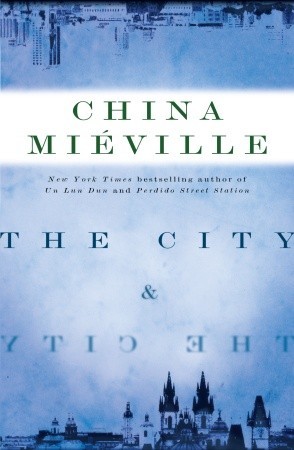The City & the City is a crime thriller set in a slightly alternative reality, in the cities of Besz and Ul Koma. It is also a work of significant imagination: Besz and Ul Koma are two cities that cover the same ground, but choose to act as separate, independent city states. People in Besz "unsee" people and buildings that are in Ul Koma and vice versa. Enforcing this strict regime of selective tunnel vision is a mysterious force called Breach.
One day, a murdered woman's body is found in Besz, and a police detective from the extreme crime squad is set on the case. But there is something strange about it, and her, and soon he finds himself in over his head in conspiracy theories, corruption, and international liaisons...
China Mieville has an enviable imagination. Perdido Street Station was a benchmark, and while his other novels are not always up to the same standards of tour-de-force-ness, The City & The City is absolutely, on many levels, a work of genius. The satirical premise is almost credible, the detail is impressive, and the story is gripping.
The things that work against it, in the end, are the resolution of the crime (I was a little disappointed), and the fact that he does stray from a perfectly realistic world into the borderline supernatural (especially when it comes to Breach), without being entirely consistent about it. In some scenes, reality is stretched in the same way that a wire-fu action scene in a movie might stretch it, or Watchmen the comic book. Not all the way into definite super-reality, but enough to make suspension of disbelief an issue in an otherwise painfully realistic novel.
I'd definitely recommend this book as a fantastic, standalone example of Mieville's power of imagination, and a decent noir crime thriller. For anyone who has never read any Mieville before, this novel might be a perfect one to try - it's not as intimidatingly huge (nor as linguistically adventurous) as Bas Lag, but it still sizzles with ideas and intelligence.
Rating: 4/5
One day, a murdered woman's body is found in Besz, and a police detective from the extreme crime squad is set on the case. But there is something strange about it, and her, and soon he finds himself in over his head in conspiracy theories, corruption, and international liaisons...
China Mieville has an enviable imagination. Perdido Street Station was a benchmark, and while his other novels are not always up to the same standards of tour-de-force-ness, The City & The City is absolutely, on many levels, a work of genius. The satirical premise is almost credible, the detail is impressive, and the story is gripping.
The things that work against it, in the end, are the resolution of the crime (I was a little disappointed), and the fact that he does stray from a perfectly realistic world into the borderline supernatural (especially when it comes to Breach), without being entirely consistent about it. In some scenes, reality is stretched in the same way that a wire-fu action scene in a movie might stretch it, or Watchmen the comic book. Not all the way into definite super-reality, but enough to make suspension of disbelief an issue in an otherwise painfully realistic novel.
I'd definitely recommend this book as a fantastic, standalone example of Mieville's power of imagination, and a decent noir crime thriller. For anyone who has never read any Mieville before, this novel might be a perfect one to try - it's not as intimidatingly huge (nor as linguistically adventurous) as Bas Lag, but it still sizzles with ideas and intelligence.
Rating: 4/5


